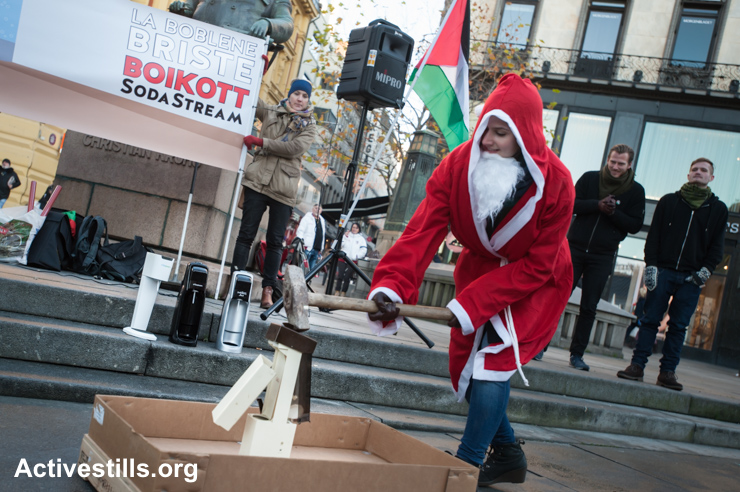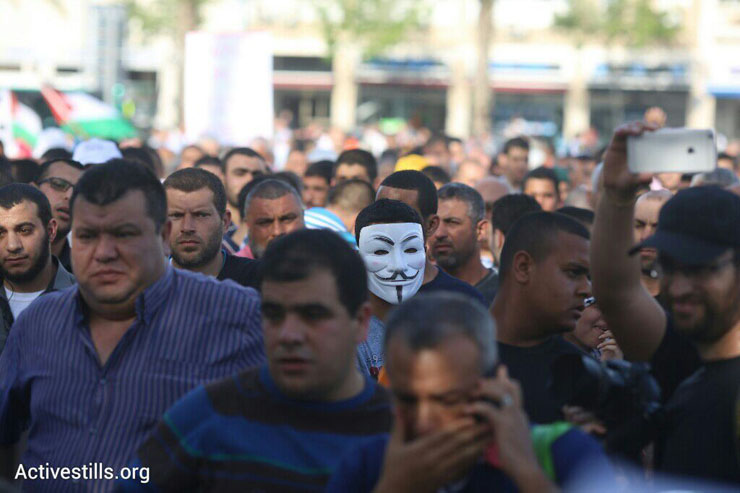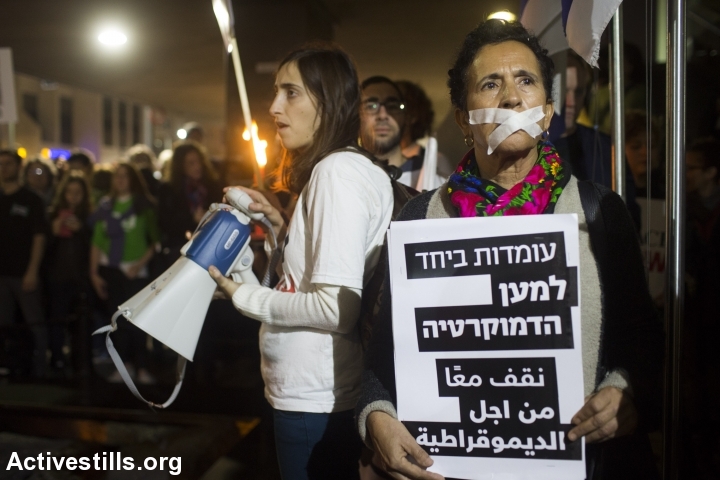The Israeli government may be cracking down on human rights NGOs and left-wing activists, but Palestinians citizens of Israel are the ones suffering from concrete persecution — with sometimes fatal results.

The recently-passed law prohibiting the entry of boycott supporters into Israel is just the latest in a string of legislation and administrative measures aimed at curtailing freedoms and cracking down on dissent against the occupation. But this broad trend actually obscures two separate phenomena, with distinct dynamics and implications.
The first one is the ongoing oppression of Palestinian citizens of Israel. Although better off than the non-citizens in the West Bank and Gaza, this minority has long suffered discrimination and mistreatment at the hands of Israeli authorities. Unfair budgeting and planning, land confiscations, surveillance and political suppression, even outright state violence, are some of the methods used to marginalize almost a fifth of the country’s population. While the level of mistreatment ebbs and flows — sometimes in response to political or cultural assertion by Palestinian citizens — its fundamental nature remains the same.
The second phenomenon, which has developed more recently, is the targeting of mainly Jewish dissenters from civil society, academia and the arts. Ironically, this trend was pioneered from within civil society itself, by groups such as NGO Monitor, Israel Academia Monitor, and Im Tirzu, who have initiated public campaigns to demonize human rights organizations and university professors critical of the occupation. Soon enough, however, they were joined by legislators and the government. The Association for Civil Rights in Israel (ACRI) has been tracking this issue, including several laws that passed, dozens that have been proposed, numerous administrative measures, and numerous statements by government officials.

These two phenomena are interlinked and often overlap, but they are very clearly distinguished in their scope and actual effect. Palestinian citizens of Israel suffer concrete persecution, with sometimes fatal results. Jewish dissenters have been maligned and intimidated, but so far, have suffered much more limited material consequences.
In fact, these two crackdowns appear to serve different ends. Moves against Palestinian citizens are aimed at keeping them down and maintaining Jewish privilege. Palestinians are seen as a significant threat which needs to be contained, and treated as such. Jewish dissenters, on the other hand, are mainly targeted as a way of grandstanding for the right-wing public, with the marginal benefit of causing distress and sowing fear among them. Non-Palestinian activists and organizations are not viewed as a major threat — at least not by those with actual decision making authority.
We can observe this difference through the different strategies of suppression in play. Most of the actions against Palestinian citizens are routine: they are embedded, sometimes tacitly and sometimes explicitly, in a wide variety of laws and regulations, including in arcane subjects such as building regulations or civil service standards. A lot of this suppression has no legal basis, and is even formally illegal, but nonetheless diligently implemented by officials at different agencies and levels of seniority, often claiming to act out of other considerations. The overtly public measures, such as the law currently being discussed that targets the Muslim call to prayer under the guise of noise regulations, are just the tip of the iceberg. It is the invisible and quiet work that is the main edifice of oppressive policy.
Actions against (mostly) non-Palestinian groups play out quite differently. There the main focus is on rhetoric and public measures. Most of the legislation that is proposed doesn’t pass, and when it does, it is often diluted to the point of being virtually superfluous. The recent law against the entry of boycott supporters is a case in point. Presently, the Interior Ministry has broad discretion on entry to Israel, and often uses it to block entry and harass anti-occupation activists, whether they support boycotts or not. The law appears to cement this approach in regards to boycott supporters, but establishes no enforcement mechanism, even allowing the ministry to exempt any individual it wants as long as it documents unspecified “special considerations.” Even in the unlikely scenario that a future interior minister would want to be lax toward boycott activists, this law is not effectively designed to constrain such a policy.

The gap is even more pronounced when it comes to NGOs. In recent years the Knesset has passed legislation, clearly aimed at human rights and anti-occupation groups, imposing irksome transparency requirements on NGOs receiving funding from foreign entities. So far, however, it has resulted in little harm to these organizations. What’s odd about this is that Israel’s current NGO laws are notoriously draconian, especially as they are interpreted by the Ministry of Justice, currently headed by an extreme right winger. Yet there is no real evidence of administrative enforcement targeting these groups, even if only to harass them and get them caught up in red tape.
If one is trying to sabotage the operations of anti-occupation organizations or prevent the entry of BDS activists, the measures undertaken so far are actually counter-productive. They provoke international criticism and evoke sympathy for the targets, even from those who are otherwise hostile to their cause but supportive of liberal political norms. And this price is paid in return for laws that don’t actually make life that much harder for their intended targets. In fact, hindering them would be much more effectively achieved by silent and targeted action, such as working through administrative channels.
The comparison with suppression of Palestinian citizens makes it clear that this goes beyond mere incompetence. When it wants to, the state can be quite competent at stifling dissent. It appears that when the target is non-Palestinian, the agenda is dictated by politician’s need to appear more-nationalist-than-thou to her or his right wing audience — rather than by actual concerns over dissent. With that goal in mind, making a lot of noise without material consequences makes more sense.
That is not to say that these campaigns against non-Palestinian have no effect. They de-legitimize, marginalize, and intimidate those working against the occupation. There is genuine fear among activists, and organizations devote considerable resources to this issue, which they could otherwise turn toward direct anti-occupation activities. But if the government really wanted to, it could achieve much greater effects for a smaller price. That’s what it does to Palestinians.


